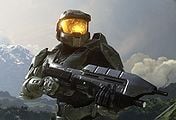List of references to Greek mythology in the Halo series: Difference between revisions
From Halopedia, the Halo wiki
No edit summary |
|||
| Line 4: | Line 4: | ||
There are many things in the [[Halo Universe]] related to Greek Mythology (and other real things that had to do with Greece). Below are some examples of them: | There are many things in the [[Halo Universe]] related to Greek Mythology (and other real things that had to do with Greece). Below are some examples of them: | ||
'''Tartarus''': [[Tartarus]], a [[Brute Chieftain]] from [[Halo 2]], was named after part of the worst, most cruel part of the Underworld, where the original Cyclopes and Hekatonkheires were sealed by their Titan parents, and later the Titans themselves became inhabitants of Tartarus. In Tartarus, the worst people and | '''Tartarus''': [[Tartarus]], a [[Brute Chieftain]] from [[Halo 2]], was named after part of the [http://en.wikipedia.org/wiki/Tartarus worst, most cruel part] of the Underworld, where the original Cyclopes and [http://en.wikipedia.org/wiki/Hekatonkheires Hekatonkheires] were sealed by their Titan parents, and later the Titans themselves became inhabitants of Tartarus. In Tartarus, the worst people and things were said to go here for eternal torture. | ||
'''Déjà''': [[Déjà]] from the the novel: [[Halo: The Fall of Reach]], was a [[UNSC]] [[AI]] responsible for the first-stage training of the Spartans. She took on the appearance of an ancient Greek goddess, although which one is not specified. | '''Déjà''': [[Déjà]] from the the novel: [[Halo: The Fall of Reach]], was a [[UNSC]] [[AI]] responsible for the first-stage training of the Spartans. She took on the appearance of an ancient Greek goddess, although which one is not specified. | ||
'''Iris''': [[Iris]] was another video game. Iris, in Greek mythology, was a minor god of the rainbow and the messenger of the gods | '''Iris''': [[Iris]] was another video game. Iris, in Greek mythology, was a minor god of the rainbow and the messenger of the gods, like Hermes. | ||
'''Prometheus''': [[Operation: PROMETHEUS]] was named after a Titan who stole fire from god Zeus and gave it to mortals, and was subsequently punished by Zeus and Poisedon, the kings of Olympus by being forced to endure his liver being pecked out in the mornings, having it | '''Prometheus''': [[Operation: PROMETHEUS]] was named after a Titan who stole fire from god Zeus and gave it to mortals, and was subsequently punished by Zeus and Poisedon, the kings of Olympus by being forced to endure his liver being pecked out in the mornings by the vulture Ethon, having it regrown, and then pecked out again the next day. | ||
'''Trebuchet''': [[Operation: TREBUCHET]] was the UNSC's counter to uprisings in the [[Outer Colonies]]. In Greek history, the trebuchet was a siege weapon that used counterweight to sling bolders, and other objects into an enemy's castle or lines. | '''Trebuchet''': [[Operation: TREBUCHET]] was the UNSC's counter to uprisings in the [[Outer Colonies]]. In Greek history, the trebuchet was a siege weapon that used counterweight to sling bolders, and other objects into an enemy's castle or lines. | ||
'''Sparta''': The [[Spartan-I]]'s, [[Spartan-II]]'s and [[Spartan-III]]'s were named after | '''Sparta''': The [[Spartan-I]]'s, [[Spartan-II]]'s and [[Spartan-III]]'s were named after the [http://en.wikipedia.org/wiki/Spartan_Army Spartan] warriors who originated in a city-state in the southern part of ancient Greece. The city-state retained the superior military power in the region between 650 and 363 B.C. Its citizens were following the simplest way of life as possible. They were all exercised, and their children, like the Halo SPARTANS, were trained from a very young age for many years. | ||
'''Spartans''': The [[Spartans]] in Halo were named after the Spartans, the warriors of Sparta. | '''Spartans''': The [[Spartans]] in Halo were named after the Spartans, the warriors of Sparta. | ||
Revision as of 18:29, September 3, 2008
| This article does not meet the wiki's general standards and/or standards on layouts. You can help by cleaning this article. |
Greek Mythology in the Halo Universe
There are many things in the Halo Universe related to Greek Mythology (and other real things that had to do with Greece). Below are some examples of them:
Tartarus: Tartarus, a Brute Chieftain from Halo 2, was named after part of the worst, most cruel part of the Underworld, where the original Cyclopes and Hekatonkheires were sealed by their Titan parents, and later the Titans themselves became inhabitants of Tartarus. In Tartarus, the worst people and things were said to go here for eternal torture.
Déjà: Déjà from the the novel: Halo: The Fall of Reach, was a UNSC AI responsible for the first-stage training of the Spartans. She took on the appearance of an ancient Greek goddess, although which one is not specified.
Iris: Iris was another video game. Iris, in Greek mythology, was a minor god of the rainbow and the messenger of the gods, like Hermes.
Prometheus: Operation: PROMETHEUS was named after a Titan who stole fire from god Zeus and gave it to mortals, and was subsequently punished by Zeus and Poisedon, the kings of Olympus by being forced to endure his liver being pecked out in the mornings by the vulture Ethon, having it regrown, and then pecked out again the next day.
Trebuchet: Operation: TREBUCHET was the UNSC's counter to uprisings in the Outer Colonies. In Greek history, the trebuchet was a siege weapon that used counterweight to sling bolders, and other objects into an enemy's castle or lines.
Sparta: The Spartan-I's, Spartan-II's and Spartan-III's were named after the Spartan warriors who originated in a city-state in the southern part of ancient Greece. The city-state retained the superior military power in the region between 650 and 363 B.C. Its citizens were following the simplest way of life as possible. They were all exercised, and their children, like the Halo SPARTANS, were trained from a very young age for many years.
Spartans: The Spartans in Halo were named after the Spartans, the warriors of Sparta.
Leonidas: In the Delta Halo Suite of the Halo 2: Original Soundtrack, is a track called "Leonidas". Leonidas was a Spartan king from around 488 B.C. to 480 B.C. He died during the Battle of Thermopylae.
Chiron: Chiron TL-34, a multiplayer map from Halo: Combat Evolved, is named after a Centaur who trained Herakles.
Cyclops: The Cyclops is a UNSC unit available in Halo Wars, named after a group of mythical giants with only one eye in the middle of their head. Some were descendants of the Titans, while another was the son of Poseidon. Odysseus, while returning to his homeland, was captured by Cyclops on their island. He used his intelligence to get out, saving his friends from them.
The Elephants on Sandtrap have the words Leviathan and Behemoth printed on their sides. Both are mythological creatures, with their names rooted in the Greek language, though not from Greek mythology.
Herakles: The only surviving warship to survive the UNSC's first Naval encounter with the Covenant was a Destroyer named the UNSC Heracles. Hercules was a a divine hero, the son of Zeus and Alcmene, nephew of Amphitryon, who is most famous for doing the Labours of Heracles.[1]
Images
- Mr. Mohawk from HGN.PNG
The Brute Chieftain, Tartarus.
Chiron TL-34, in Halo: Combat Evolved.
- H3 Elephant Sharpened2.jpg
The UNSC's Behemoth-class Troop Transport
John-117, or Master Chief, a Spartan super soldier of the UNSC.
- Movie Concept 2.jpg
SPARTAN training on Reach.

